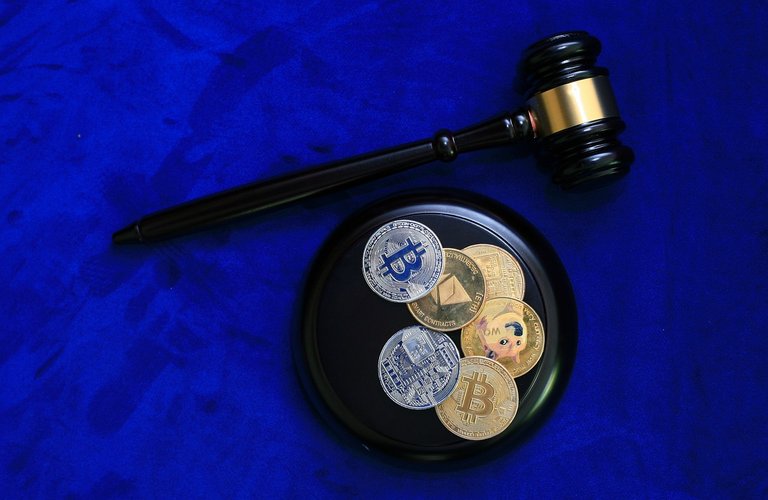UK's Crypto Revolution
The UK government finally seems to have made up its mind to embrace the 21st century and agree with the rest of the world that crypto is more than magic internet money. Of broader interest, its new "Property (Digital Assets) Bill" introduces a new category of property called digital property, which cryptocurrencies, NFTs, and, wait for it, carbon credits fall under. Superficially, this should be excellent news for crypto purists and another step in the right direction for widespread adoption.
Not so fast, though.

Of course, the government will sell it as "greater legal protection" for all the tech-savvy bitcoin hodlers and NFT collectors. The state feels good, claiming that judges will be better equipped to handle even more complicated cases of those messy divorce settlements when, all of a sudden, one's Bored Ape collection is up for grabs. On the contrary, each time this happens, the government gets chummy with crypto and wraps it in some shiny-looking wrapper.
Let's face it, Governments are not exactly the finest examples of leaders in the modern understanding of technology. Just think about how Mark Zuckerberg had to teach Congress through that testimony on what Facebook does to make money. So color me suspicious when the UK, out of nowhere, says, "Time we board the wild west digital assets boat."
Now, let me not be totally negative here.
There do appear to be a couple of upsides that immediately come to mind. With just a bit more clarity in the legal boundaries of crypto, maybe businesses and investors could work within a more stable environment. It potentially would even attract more institutional money, hence driving innovation and growth. And if it means fewer people are getting scammed out of life savings by some shady "to the moon" project, sure.
But if the government views crypto as personal property, then in essence what the government is saying is, "Hey, we see you've got some nice digital assets. It would be a shame if something were to happen to them. Like taxes." That's right, folks; these first meaningful pieces of legislation regarding personal property classification of crypto might very well be that baby step toward fuller implementation of taxation. After all, nobody got into Bitcoin to pay more taxes.
The Labour government is already out from these elections with its hands rubbing in glee at the view of a hike in universal taxes. Now, at this juncture when cryptos have already been declared, one can easily picture, say, the Department of Internal Revenue peering into those digital wallets already as new citrus. It's like they discovered a mine in the metaverse, and forthwith they cannot wait to start digging.
It's not only about the taxes.
Such a new classification can also grant broader seizure powers of digital assets to the government depending on the conditions. Just think of crypto holdings being frozen or confiscated just as easily as one may have their bank accounts frozen. All this far from that utopian, decentralized, censorship-resistant wide field dreamed of by many crypto adopters some time ago.
Then, of course, there is the matter of privacy. One of the major draws with cryptocurrency has always been the level of anonymity it comes with. But with this new legal framework, it's not too hard to envision some sort of Orwellian future in which every transaction is tracked, traced, and reported to the taxman. It would be like trying to have a secret conversation in a room full of government-issued microphones.
More optimistic observers have already begun to conjecture that new legislation on stablecoins may appear in the UK by the end of 2024. While this can give even more stability and, to a certain extent, legitimacy to the crypto market, the question of centralization and control arises.
Wasn't the very idea of crypto that there shouldn't be any government control over the currency?
That's kind of like, at the end of the day, inviting a vampire in because he was charming - but you know he really has his sights set on your very lifeblood, or in this case, your digital assets. The UK government says it is trying to help while tightening its grip on the crypto ecosystem.

What is a crypto enthusiast to do in this brave new world where even governments are finally recognizing their digital assets?
Be alert when such legislation is in the offing and be ready to move with the changes. It may just be time to dust off those privacy coins or look into decentralized finance options, it's much harder to regulate.
Let's not forget that this crypto revolution was never going to dance to the tune of the government. It was supposed to be the financial system of independence, actually returning the power back into the hands of the individual. This might as well prove to be one step forward for UK legislation but two steps backward if the matter is not carefully addresse
Posted Using InLeo Alpha
Congratulations @bitblaze! You have completed the following achievement on the Hive blockchain And have been rewarded with New badge(s)
Your next target is to reach 2750 upvotes.
You can view your badges on your board and compare yourself to others in the Ranking
If you no longer want to receive notifications, reply to this comment with the word
STOPCheck out our last posts: